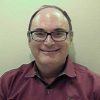A new software program in development by MEHP alumnus R. Samuel Mayer, MD (MEd, ’16), and colleagues took top prize at a Johns Hopkins “Shark Tank”–style event and will soon be rolled out to medical education training programs across the country.
“One of the problems that really impacts medical education is that our learners repeatedly tell us they learn the most from clinics with patients,” says Mayer, vice chair of education for the Department of Physical Medicine and Rehabilitation at the Johns Hopkins University School of Medicine. “At the same time, in the patient care setting, things can be very chaotic, and it’s difficult to sit down and really review cases when you’re in a busy clinic or hospital unit.”
So Mayer joined forces with Krishnaj Gourab, MD, a physiatrist at the University of Maryland with subspecialty training in health information technology, and three physical medicine and rehabilitation senior residents at Johns Hopkins, Bernard Abrams, MD, Stephanie Van, MD, and Alexis Boslich, DO, to develop a plan to enhance bedside teaching. The result? A program called Learn Nexus.
“It’s based on the premise that the learner will write down a short reflection of what they’ve learned that day, and then send out a question about what they want to learn next,” Mayer explains. The question then gets emailed or texted to the teacher or any other relevant experts from their group so the expert can reply.
For example, says Mayer, if students are on a spinal cord rotation learning about bladder problems in spinal cord patients, they can ask a question about what medications are appropriate to treat which problems. That would get sent out to the spinal cord attending physician. All questions within a particular category are categorized and archived so they can be searched by other learners.
“It creates this whole community of learners,” says Mayer. “And it really gets to the idea of precision education, that it’s really geared toward adult learners who are letting us know what they want to learn next.”
A presentation about the program in April 2018 won the top prize at Johns Hopkins Institute for Excellence in Education’s annual “Shark Tank”–style event, with education experts reviewing a number of funding proposals for educational programs in development. Mayer walked away with a $10,000 prize, which was used to further enhance the program.
To date, Learn Nexus has been beta tested with 18 physical medicine and rehabilitation residents at Johns Hopkins, and Mayer and colleagues are about to roll it out to some other residency programs within Johns Hopkins and nationally. For now, the program is offered at no cost, with the idea to sell advertising space to help fund it longer term.
Mayer says the MEHP program helped inspire the idea: “The whole idea of having learners reflect and ask questions about what they learned is a classic trick they taught us in teaching methodologies.”

